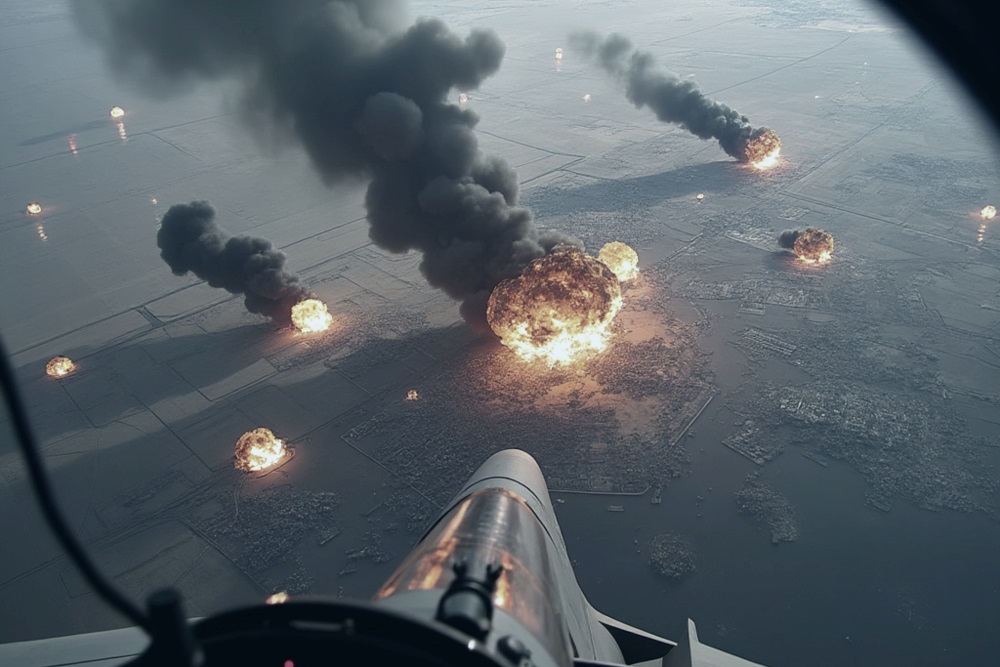
Israel carried out a large-scale assault on Iranian military sites, striking approximately 20 targets in three waves of precise airstrikes.
Early reports indicate that the IDF neutralized air defense systems, bombed missile bases and production sites, and hit UAV development and manufacturing facilities.
Israel aimed to accomplish three primary objectives in this strike:
- Inflict significant damage to Iran’s military capabilities.
- Expose the Iranian regime’s weakness and inability to defend itself.
- Avoid triggering a broader conflict or an extended war of attrition.
An initial assessment suggests that Israel achieved all three goals.
Iran’s weak defenses
Critical elements of Iran’s defense industry and missile infrastructure were destroyed, likely causing billions in damages and reducing Tehran’s operational military capacity.
Moreover, the strike showcased Israel’s exceptional military capabilities, sending a deeply troubling message to Iran. The IDF mobilized dozens of fighter jets for the operation, penetrated Iranian air defenses with ease, and carried out bombing runs inside Iran for three uninterrupted hours.
Despite years of boasting about the effectiveness of its air defenses, Iran was left defenseless against Israel’s air power. Iranian forces were forced to watch as multiple military sites in at least three regions were bombed, with no means to stop the attack.
Ex-IDF General Yisrael Ziv told N12 News that the operation caused strategic embarrassment for Iran by publicly revealing its military helplessness. For long hours, the IDF attacked strategic military sites inside Iran at will, he said.
The strike also underscored Iran’s technological inferiority, he wrote earlier, in stark contrast to Israel’s advanced capabilities.
Calculated strike to avoid war
By targeting only military sites and avoiding nuclear and energy facilities, Israel sought to prevent a broader conflict. This strategic decision was likely a wise one: after a year of fighting on multiple fronts, Israel was not looking to ignite another major campaign for now, or to alienate the current US administration.
The aftermath of the operation leaves Iran in a difficult position. While the regime previously vowed to retaliate for any Israeli attack, doing so would invite more IDF strikes that could be more extensive. Given Iran’s deep vulnerability and exposure, this could be a terrible choice that further reveals Iranian weakness.
However, strategic expert Danny Citrinowicz notes that failing to respond could deal another blow to Iran’s deterrence and further weaken its image of strength in the region – a perception that has already been severely eroded.
Early signs indicate that Iran is attempting to downplay the assault, claiming the damage was minimal. At this time it seems increasingly likely that any Iranian retaliation, if it happens at all, will be limited.
Iran’s rapidly deteriorating status
In the broader context, Iran’s strategic position has deteriorated rapidly in recent months. Its long-standing proxy strategy – once the foundation of its national security doctrine – has largely collapsed. [here’s a detailed report on the Israeli death trap for Iran’s allies]
Ex-General Ziv says that Iran’s defense doctrine crumbled as the proxy system collapsed. This left Iran largely alone, without external defensive layers, as its proxies can no longer protect it.
Strategic analyst Citrinowicz added that Israel’s assault is directly linked to the weakness of Hezbollah, which was meant to serve as a Iran’s insurance policy against such attacks. [here’s more on the major disaster suffered by Hezbollah]
Now, Tehran’s military industries have taken a major hit with direct strikes in Iranian territory. The Israeli airstrikes also exposed Iran’s weak defenses, further complicating its ability to project strength.
Moving forward, Iran needs to urgently rethink its defense doctrine. Moreover, Tehran must prepare for the possibility of more clashes with the IDF from a position of weakness, with Israel firmly holding the upper hand.


